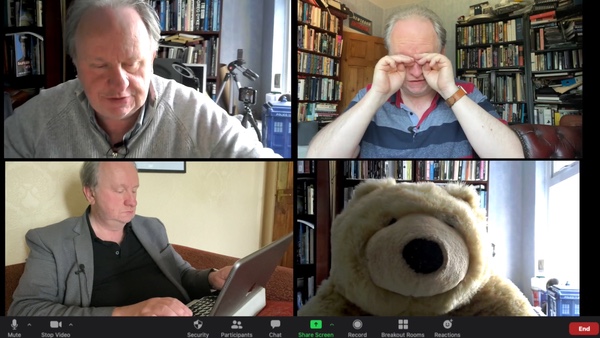I’d like to use something very specific so we can talk about something very broad. Right now, BritBox has the 1979 Arthur Hopcraft version of Tinker, Tailor, Soldier, Spy and the BBC iPlayer has the 2011 film version by Bridget O’Connor and Peter Straughan. And of course John le Carré’s original novel is available everywhere. Plus the script is online.
I’ve read that novel years ago, re-read it now, watched both the BBC and film versions, read the 2011 script, and there is a single scene in the movie that I’ve been fixating on for about a week.
In all the versions, here’s the thing. A British intelligence agent, Peter Guillam, is infiltrating his own agency to steal some files. (This is in the 1970s, files meant big paper and cardboard folders, not a USB stick or three.) It’s every bit as tense as you can imagine with Guillam diverting attention, distracting people and then of course he’s stopped just before he can get away.
He’s doing all this to investigate various senior intelligence officers and he’s stopped by one of them. Before you can wonder if he’ll find a way around this one man, he’s being escorted to all of them.
So now he’s in a closed room meeting with all the people he and we suspect, and if it’s been tense before, we are now certain the game is up.
Except, very nicely, if the game is up then it’s actually a slightly different game. Guillam is threatened, bullied, shouted at, and it’s all over the fact that, as we know, he has been speaking with a particular other agent named Ricki Tarr.
To mix spy genres for a second, Ricki Tarr has been disavowed. Meeting with him is treason, literally. So Guillam has a choice and he makes it. He claims he’s not seen Tarr and he keeps that up throughout – until he is eventually believed.
Fine. More than fine. It is a successfully tense and compelling couple of scenes and so well done that you can feel in your stomach the moment Guillam commits to his lie about not seeing this man.
In the novel.
And in the 1979 BBC version.
These same couple of scenes are in the 2011 movie, but they’re dramatically different, in every sense, because in the movie Guillam has not been speaking with Tarr. He hasn’t seen him.
In the film version, he first meets up Tarr right after these scenes and there’s a bit of action as he takes out his fear – amongst other things – on the man. But here’s the specific general point: his fear is minuscule.
He hasn’t seen Tarr so he wasn’t lying in that scene, in the film. He wasn’t lying so he can’t be caught out. In the BBC version there is every chance that the people accusing him of meeting Tarr have actually seen him do it. In the novel, he’s reasonably confident that he wasn’t under surveillance at the time. He doesn’t know, he can’t be sure, so while it’s weaker in the novel than in the BBC series, the tension is still there.
It isn’t in the film.
I liked the film when I saw it around 2011 and I liked it now, except the BBC one was so fresh in my mind that it was hard to separate them. I think that was probably why I noticed this because I do remember thinking the film was taut and tense the first time I saw it.
I keep thinking and thinking about this. About how a change in the sequence of a story can destroy tension that had otherwise been very carefully engineered.
It’s like the opposite of the Hitchcock theory that a long and boring dinner between two characters can be made riveting if they don’t know there’s a bomb under the table –– and the audience does.
I suspect that the film did the story in this sequence for one of two reasons. It could be collateral damage from decisions about other sequences, when to tell which other bits of the tale. Or it’s possible that it was done to serve Peter Guillam’a character. In the other versions, Guillam gets no big release from surviving this interrogation, no particular action.
In the film, he gets back from the interrogation, sees Tarr and makes a dive for him. It’s one of the few pieces of physical action in the story and it does also let Guillam believe some of the things his interrogators have told him. But he only gets to believe them for a moment, he only gets a brief spot of action.
If it was to give Peter Guillam a character moment, I think it came at the cost of a gigantically bigger one in that interrogation.
So if it were deliberate, I think it was just wrong. If it were a consequence of other issues in the script, other needs, then it’s a shame.
But whichever it is, there is always a reason why a scene is where and when it is in a story.
